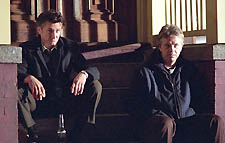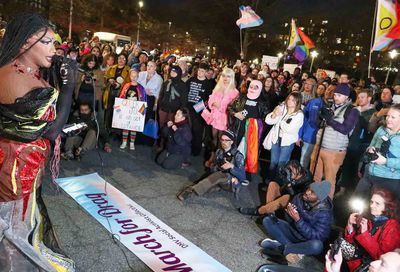Unforgivable
Mystic River
 Penn and Chapman |
When Clint Eastwood directs, his films tend to go either one way or the other. That is to say, either they’re brilliant (Unforgiven, Play Misty for Me) or insufferably dull and misconceived (Bird, Midnight in the Garden of Good and Evil). There is rarely any in-between (okay, Space Cowboys, but guilty pleasures starring old coots don’t count).
Mystic River marks Eastwood’s 24th time in the director’s chair, and for a spell at least, it seems as though his adaptation of Dennis Lehane’s crime novel is going to cook up into something magnificent. But as the movie crawls laboriously toward a climax that you can see falling from outer space, something goes wrong. What it is, I can’t exactly put my finger on. But I do know this: Despite what you might be reading elsewhere, Mystic River isn’t a work of magnificence of any kind. It is balderdash, plain and simple, a dull, derivative tale of guilt, shame, pain, suffering, redemption, revenge, little mistakes, big mistakes and about a dozen or so other adult-related problems scattered like tacks for a normally fine trio of actors — Sean Penn, Kevin Bacon and Tim Robbins — to step on and yowl.
From the enormous weight of the movie’s initial setup alone, which has to do with the abduction and molestation of an 11-year-old boy, you might feel as though you’re watching something meaningful. You’re not. You’re watching a shred of pulp crime fiction, glossed up in Hollywood tones and transferred to the screen as though the eventual tragic outcome were worthy of Shakespeare or Puccini. Lehane’s story, overwroughtly adapted for the screen by Brian Helgeland, is infused with the mythology of grand opera. But it’s opera without the singing.
 |
Instead, there’s a lot of screaming and wailing as Boston thug-gone-legit Jimmy Markum (Penn) learns that his 19-year-old daughter has been senselessly and savagely murdered. The case is being investigated by homicide detective Sean Devine (Bacon), a boyhood pal of Jimmy’s. Enter another boyhood pal, Dave Boyle (Robbins), another boyhood pal who underwent that childhood trauma mentioned earlier. Dave is what the folks in the neighborhood call “damaged goods. ” Hence, suspicion falls on Dave like a fifty-ton anvil falling on Wile E. Coyote, nevermind that it doesn’t make a whit of sense as to why Dave might kill Jimmy’s daughter.
Red herrings are served throughout Mystic River on little stale bits of dialogue. “I can’t trust my mind anymore, I’m warning you, ” Dave tells his terrified wife Celeste (Marcia Gay Harden, providing the movie’s one genuinely gripping performance).
|
The real crime here is that the three childhood friends don’t share a scene together as adults. There are semi-catalytic (and mostly catatonic) moments between Dave and Jimmy, Jimmy and Sean, Sean and Dave, but somehow events (or perhaps the actors’ busy schedules) conspire from allowing the three to share the screen in one triple-crowning blaze. The 73-year-old Eastwood directs with a classicist’s touch, clearly thinking that what he’s providing here is gravitas. Yet the movie is so old fashioned in its construct, one could suffocate from the stench of mold.
To be fair, there are a few instances of cinematic power. The opening sequence, in which the 11-year-old Dave is abducted in front of Sean and Jimmy, is artfully handled and carries a foreboding punch. Even better is the scene in which a panic-stricken Jimmy learns that it’s his daughter’s body lying in a nearby ravine. Penn plays the moment with such brutal anguish that it sears our souls. Unfortunately, his remaining dramatic moments amount to paper cuts.
The single worst aspect of Mystic River is its score, a cloying four-note refrain repeated ad infinitum. It should come as no surprise, perhaps, that Eastwood himself composed this little ditty that intrudes on the film like an uninvited guest. But when you have as much clout in Hollywood as Sir Eastwood, you can pretty much do write your own ticket. And, obviously, music.
Mystic River doesn’t make anyone’s day. Especially not ours.
Support Metro Weekly’s Journalism
These are challenging times for news organizations. And yet it’s crucial we stay active and provide vital resources and information to both our local readers and the world. So won’t you please take a moment and consider supporting Metro Weekly with a membership? For as little as $5 a month, you can help ensure Metro Weekly magazine and MetroWeekly.com remain free, viable resources as we provide the best, most diverse, culturally-resonant LGBTQ coverage in both the D.C. region and around the world. Memberships come with exclusive perks and discounts, your own personal digital delivery of each week’s magazine (and an archive), access to our Member's Lounge when it launches this fall, and exclusive members-only items like Metro Weekly Membership Mugs and Tote Bags! Check out all our membership levels here and please join us today!





















